In this confrontation between the iRobot S9 vs Shark IQ Robot, the former is ultimately better than the latter. The iRobot S9 exhibits great cleaning performance across various surfaces, can remember more layouts, excels in edge cleaning, prevents hair tangles better, and operates with a greater app. Given these advantages, it comes with a price tag significantly higher than that of the Shark IQ.
iRobot S9 Vs Shark IQ Robot: Comparison Chart
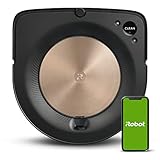



iRobot S9 Vs Shark IQ Robot: Differences
The iRobot S9 outshines the Shark IQ Robot with a win of 5-2, and here is my detailed comparison between these smart bots!
Cleaning Performance
Winner: iRobot S9
Hard Floor
| iRobot S9 | Shark IQ |
|---|---|
| ≈ 99% | ≈ 96% |
Both the iRobot S9 and Shark IQ Robot demonstrated outstanding performance on my hardwood floors. They could clear away almost all the debris without issue, with the S9 achieving a remarkable score of 99%, showcasing its superior capability, while the Shark IQ was close.
Carpet
| iRobot S9 | Shark IQ | |
|---|---|---|
| Low-pile Carpet | ≈ 99% | ≈ 82 % |
| High-pile Carpet | ≈ 99% | ≈89 % |
The iRobot S9 still delivered good performance on both of my low- and high-pile carpets, with very high scores across the board. Meanwhile, the Shark IQ was just okay and struggled significantly with finer debris.
Hair Pet
| iRobot S9 | Shark IQ | |
|---|---|---|
| 5-inch Strands | ≈ 89% | ≈ 91% |
| 10-inch Strands | ≈ 78% | ≈ 58% |
Both robots excelled at collecting 5-inch hair strands but struggled significantly with 10-inch strands. The good news is that they demonstrated their great ability to combat tangles effectively and are easy to remove to clear stuck debris or hair wraps.
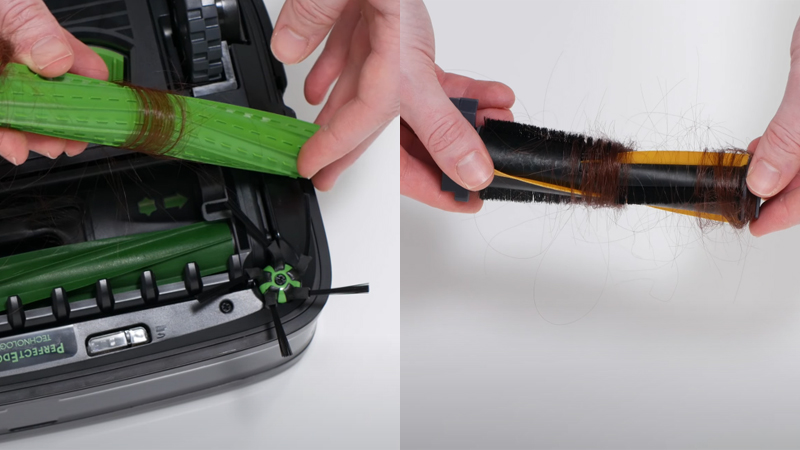
Design & Usability
Winner: iRobot S9
Dimensions & Weight
| iRobot S9 | Shark IQ | |
|---|---|---|
| Dimensions (W x H) | 12.25 x 3.5 inches | 12.6 x 3.5 inches |
| Weight | 8.15 lbs | 5.5 lbs |
The S9 and the IQ both sport a sleek, low-profile design, effortlessly navigating beneath furniture with limited clearance. But while the IQ Robot doesn’t look very different from most other robots on the market, the S9 says no to the familiar circular design. Instead, the S9 boasts a D-shaped structure, which iRobot claims is imbued with PerfectEdge technology for superior edge cleaning.
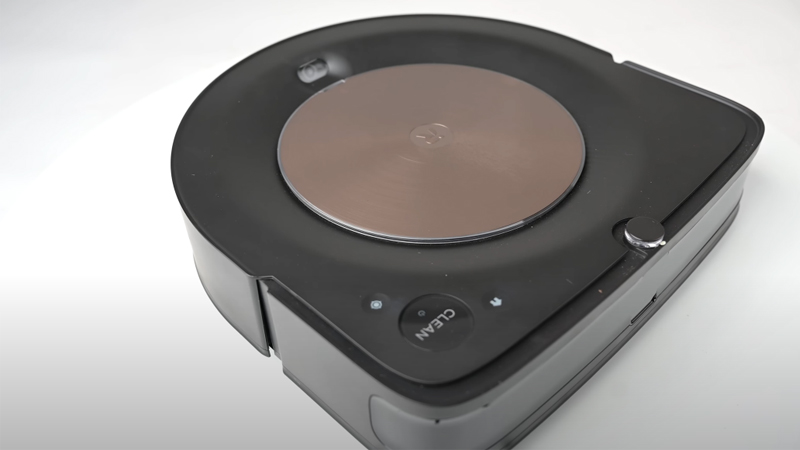
Nonetheless, the square-front design of the iRobot S9 does bring a compromise: it tends to struggle in narrow areas. This is presumably the reason why no subsequent models in the Roomba range feature this unique configuration, at least for now.
Extractor & Side Brush
Thanks to its D-shaped design, the S9 also has a pair of wider dual brushes to cover more area in every single pass. Even better, their brush rollers are devoid of bristles, and my practical tests showed their efficacy in minimizing tangles.
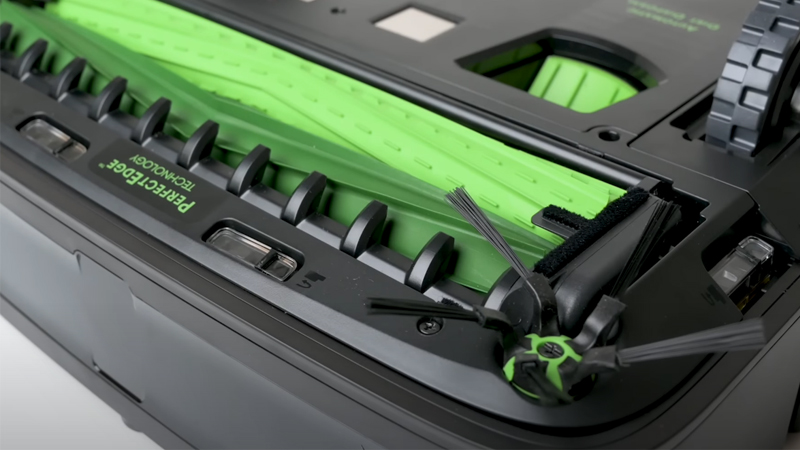
Likewise, the Shark IQ features a single spiral brushroll that uses a combination of soft bristles and rubberized paddles to prevent and eliminate tangles while it works. Shark asserts that this configuration is self-cleaning, and to a degree, it accomplishes what it promises.
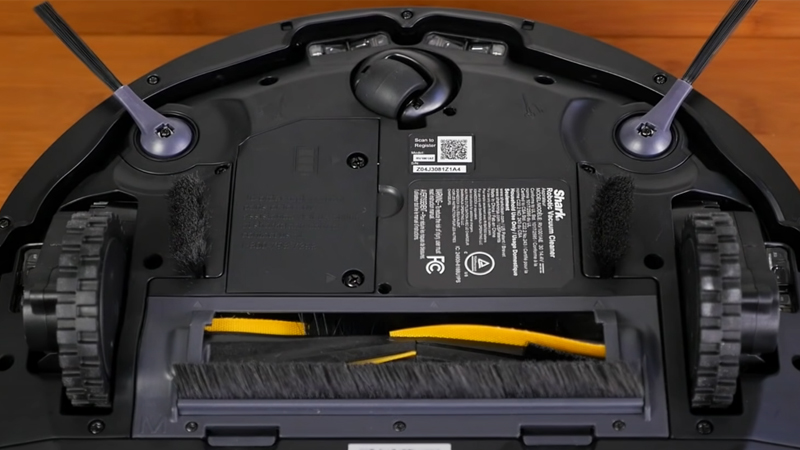
Whereas the S9 employs a 5-arm spinning brush, the Shark IQ opts for a pair of 1-prong ones. These brushes typically rotate at a slower pace, diminishing the likelihood of scattering debris across extensive areas, which is a common problem observed with many other models that feature a high-speed side brush.
Navigation
The iRobot S9 and Shark IQ will start mapping immediately after they make their first trip on your floor. Both use vSLAM navigational technology, meaning they rely on a top-mounted camera to survey and comprehend the layout of your residence, committing it to memory. Surprisingly, the genesis of this technology is research designed to aid robots in detecting landmines, showcasing its sophisticated precision and adaptability in mapping and learning new terrains.
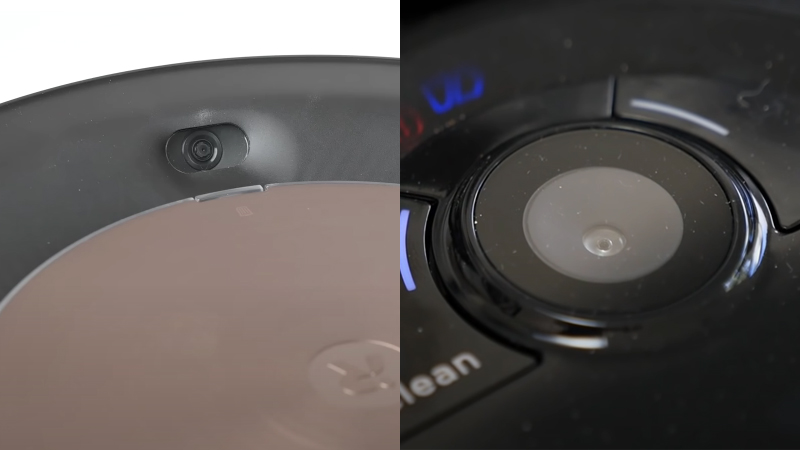
Still, the use of this vision-based technology indeed comes with some shortcomings, at least compared to its arch-rival LiDAR, which employs laser beams for navigation.
Firstly, it demands several preliminary runs to finalize mapping your house, which LiDAR-equipped bots can complete in just one cycle. My real-world experiments show that the S9 needed at least four trips, while it took the Shark IQ eight cycles to finalize the process. This was a bit annoying since, during this stage, you can’t designate specific tasks or delineate no-go areas in some zones with several wires that bots would get caught up on. Fortunately, the iRobot app has an option for “training runs,” allowing the S9 to map without actually cleaning.
What’s more, these vSLAM-based robots can struggle in low-light or dark conditions since the cameras rely on adequate lighting to capture clear, detailed images. When the environment is poorly lit, the camera might not be able to distinguish between objects, boundaries, and surfaces properly, which could lead to navigation errors and less effective cleaning.
The navigation on these bots is overall pretty good. They get around and clean in straight lines rather than a random pattern like low-level robots. A minor hiccup with the Shark IQ was its initial struggle to locate the dock, requiring my intervention on several occasions—but just consider this an initial hiccup.
A significant point of difference between the iRobot S9 vs Shark IQ Robot is that the S9 is able to create and store up to 10 different maps, in contrast to the IQ, which can only hold one. Therefore, for individuals living in multi-story dwellings, opting for the S9 is a wise choice unless you are happy with your bot continuously recreating the map or buy a couple of robots (which, let’s be real, isn’t ideal for the majority!)
Battery Life
| iRobot S9 | Shark IQ | |
|---|---|---|
| Battery Life | ≈ 63–112 mins | ≈ 69–82 mins |
| Charging Time | ≈ 196 mins | ≈ 210 mins |
The operational lifespan of these robots between charges is neither outstanding nor poor, and the battery may drain faster or slower depending on the suction level selected. But, honestly, who cares? Given that they use a “Recharge & Resume” function?
Unlike stick or upright vacuums, they have the aptitude to automatically navigate back to the docking station to recharge when the battery is low during a cleaning session and then proceed to finish the chore. That way, they can get the job done without your intervention in terms of recharging.
Control
Winner: iRobot S9
Manual Control
The Shark IQ employs a two-button system for manual control, featuring a Clean button that initiates a cleaning cycle instantly and a Dock button that concludes a cleaning session and returns the bot to its base. In contrast, the S9 is equipped with three buttons: one for initiating or terminating cleaning, one for docking, and one for spot cleaning.
For those who don’t know, the “spot cleaning” button enables the Roomba S9+ to clean a circular area with a diameter of about 3 feet (approximately 0.9 meters). It is particularly useful when you have a localized mess that needs immediate attention and don’t want the robot to clean the entire room or house.
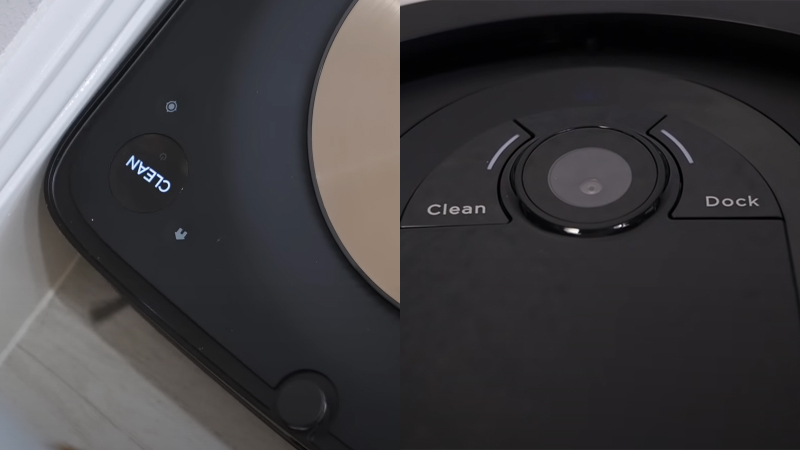
App Connectivity
From the get-go, it’s clear that the iRobot and SharkClean apps do not offer live maps, an innovative feature that is available in Roborock and Dreame. This cool feature allows you to track the bot’s location in real-time to ensure it never gets lost, so I would be happy should iRobot and Shark decide to incorporate it in the future.
These two apps share a lot of characteristics, such as naming rooms, adding no-entry zones (blocking the robot from entering these areas), and scheduling cleaning for automated runs. They also let you toggle between power settings and control the robot by voice since both can connect to Amazon Alexa.
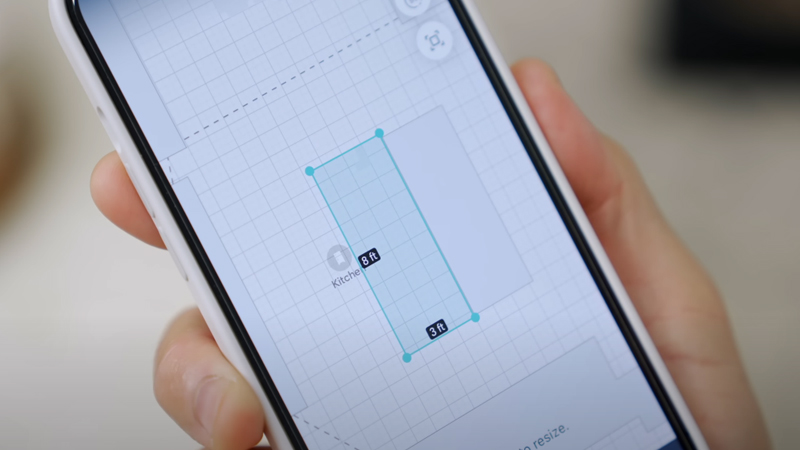
The iRobot has some additional options that make it better than SharkClean. For example, it allows you to create “clean zones” where you want the S9 to focus or has the “Clean when I Leave” option, which activates the robot every time you are not at home. Additionally, it enables the coupling of the S9 with the Braava Jet M6 mopping robot using the imprint link feature, achieving coordinated cleaning.
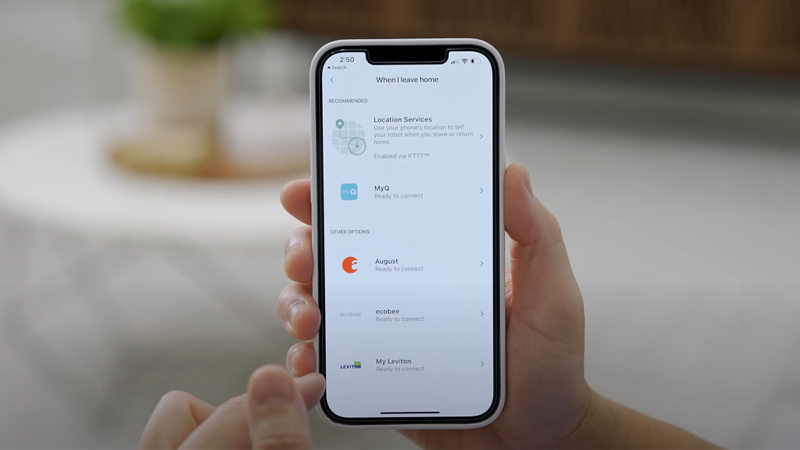
Cleaning & Maintenance
Winner: Tie
Although the iRobot S9 vs Shark IQ Robot have the capability to recharge autonomously when the battery is depleted, they lack the feature to self-empty their dust containers. This can be quite annoying given that they share a small 500-ml bin that may need to be emptied quite often.
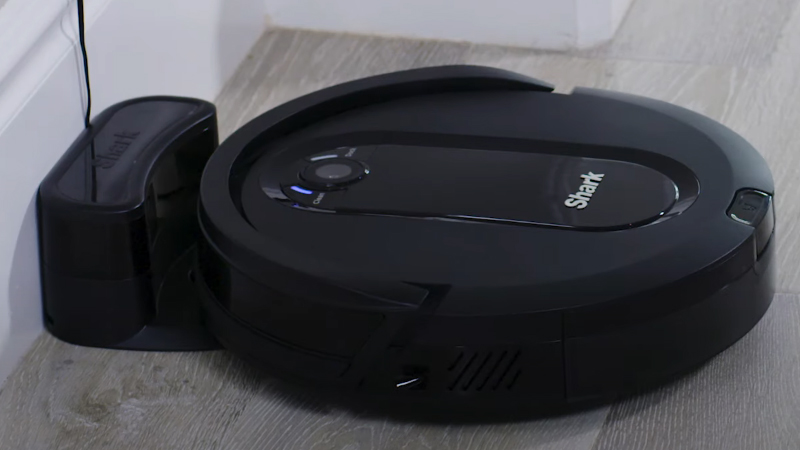
If severe allergies are a concern for you or you simply prefer to keep your hands clean, you might want to explore their advanced versions equipped with self-cleaning stations: the iRobot S9+ and Shark IQ Self-Empty. Similar to the Recharge & Resume function, these little housekeepers autonomously navigate back to their clean bases to discharge their contents and then resume their duties from where they paused. While the base that comes with the S9 Plus is bagged, the Shark IQ base simply uses a larger dust bin.
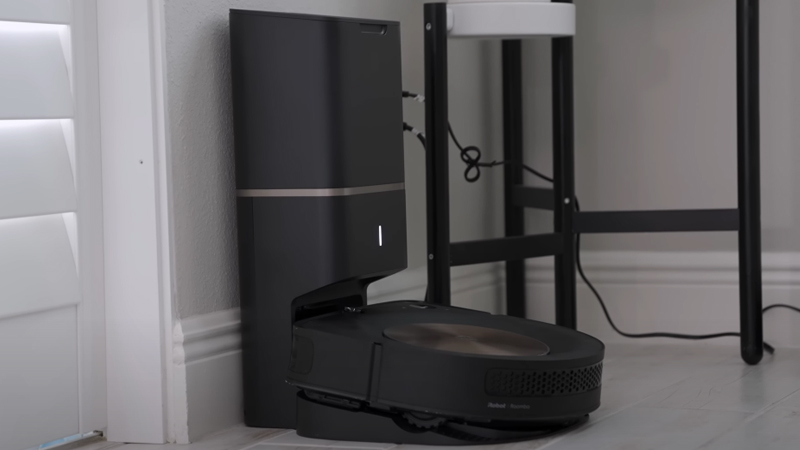
Speaking of the filtration system, the S9 employs a HEPA filter, requiring a gentle tap against the waste bin to disengage any clinging particles. In contrast, the Shark IQ integrates foam and HEPA filters, both of which are washable and capable of multiple uses.
Other Features
Winner: Tie
Noise
| iRobot S9 | Shark IQ | |
|---|---|---|
| Working | ≈ 60-74 dB | ≈ 61-69 dB |
| Self-Emptying | None | None |
These bots are fairly noisy when operating, but it is a common problem with most vacuum cleaners, including robots. I got used to the sound, but it could be disturbing for many. So if such continuous, high-pitched noise is inconvenient for you, it would be advisable to schedule the cleaning sessions for when you’re not at home. As previously mentioned, the iRobot app has a “Clean When I Leave” option, allowing the S9 to clean only when you’re not at home.
Mopping Ability
In today’s market, there is a plethora of hybrid robots that can vacuum and mop simultaneously, but the iRobot S9 vs Shark IQ Robot don’t fall into this category. Consequently, manual mopping is necessary, or adding a dedicated mopping robot to your collection would be a suitable alternative.
Magnetic Strip
The Shark IQ comes equipped with a magnetic tape strip, allowing for the creation of physical restrictions on your floors. This is especially useful for blocking off some diagonal areas that virtual “no-go zone” boxes can’t. It’s basically similar to the “virtual wall” feature found in the Roborock app.
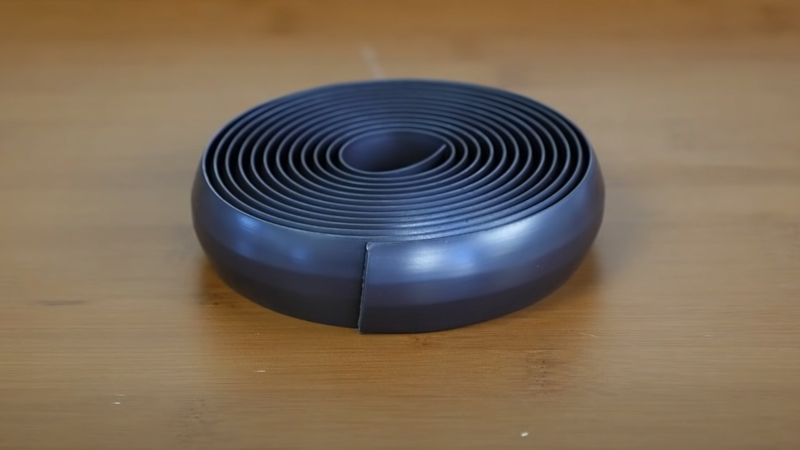
Quick Rundown Of iRobot S9
- DEEPEST CLEAN - With 40X the suction power, the superior 3-Stage Cleaning System lifts, loosens, then eliminates debris & pet hair from deep within your carpets. Increases suction to clean even deeper into carpets with power boost technology.
- DETAILED POWERFUL CLEAN - PerfectEdge Technology with advanced sensors & a specially designed Corner Brush optimize cleaning deep into corners & along edges. Ideal for homes with pets. 30% wider Dual Rubber Brushes don't get tangled with pet hair.
- GUIDED BY SERIOUS SMARTS - With vSLAM navigation, the s9 learns the layout of your home & builds personal Smart Maps, enabling it to expertly clean & navigate in neat, efficient rows. If it’s running low on battery, it recharges & resumes cleaning.
- VACUUMS MESSES IN THE MOMENT - Cleaning crumbs is now as easy as “Roomba, clean under the kitchen table.” A simple request to your voice assistant or via the app enables the s9 to clean messes for you, right when they happen.
- COMPLETE CONTROL OF YOUR CLEAN - With Smart Mapping, your robot knows your kitchen from your living room, so you can decide where it cleans & when. & with Keep Out Zones, your robot knows to avoid sensitive areas like pet bowls or play areas.
Quick Rundown Of Shark IQ
- Unbeatable suction vs. any Shark robot vacuum for pickup of large and small debris, as well as pet hair on carpets and hard-floors.
- Self-cleaning brushroll removes pet hair and long hair from the brushroll as it cleans--no more hair wrap.
- Schedule whole-home cleanings or target specific rooms or areas to clean right now with the Shark Clean app or voice control with Amazon Alexa or Google Assistant.
- Total Home Mapping with Room Select maps your home and lets you choose which rooms to clean right now.
- Methodically cleans row by row and then navigates room to room for complete home coverage.
Product Videos
Related Articles to Roomba S9
- Comparing The Roborock S7 Vs iRobot S9: Which Prevails?
- iRobot Roomba 980 Vs S9: A Detailed Comparison
- A Detailed Face-Off Competition Of Roborock S8 Vs Roomba S9
- An Ultimate Guide to Deciding Between The Neato D10 Vs Roomba S9
- iRobot I7 Vs S9: Which High-End iRobot Roomba is Better?
- Dyson 360 Heurist Vs Roomba S9 Robot Vacuum Detailed Comparison
- iRobot S9 Vs S9+ Detailed Comparison: Are There Any Differences?
- Roborock S7 MaxV Vs iRobot S9: A Head-To-Head Comparison
Related Articles to Shark Iq
- Shark AI Vs Shark IQ: A Combat Of Entry-Level Bots – Shark AI (AV2001, RV2001) & IQ (AV993, AV970)
- iRobot Roomba S9+ Vs Shark IQ: Which One Is Better?
References:
- iRobot S9: https://www.irobot.com/en_US/roomba-vacuuming/robot-vacuum-irobot-roomba-s9-plus/S955020.html
- Shark IQ: http://206.47.165.218/support/product-series/1214/shark-iq-robot-vacuum-r100-with-wi-fi-and-home-mapping/

Richard B. Schmidt is a prominent figure in the vacuum cleaner industry, boasting over 15 years of expertise. Armed with a Robotics Engineering degree from Northeastern University and a Master’s in Consumer Science from Harvard, his unique blend of technical knowledge and consumer insights positions him as a sought-after authority in vacuum cleaner evaluation. Richard’s career began at Dyson, where he contributed to the development of innovative vacuum models. Transitioning to advocacy and reviews, he co-founded the first Vacuum-focused blog in 2008, offering comprehensive analysis and user guides for various vacuum cleaners. In 2020, he founded RoboMop.net, providing ongoing insights through columns and buyer’s guides.
